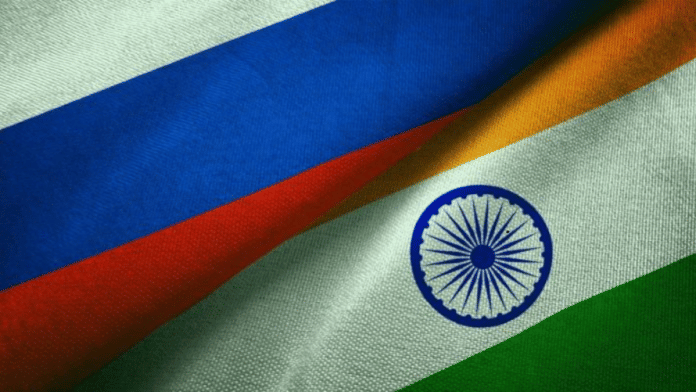Thank you dear subscribers, we are overwhelmed with your response.
Your Turn is a unique section from ThePrint featuring points of view from its subscribers. If you are a subscriber, have a point of view, please send it to us. If not, do subscribe here: https://theprint.in/subscribe/
When Russia invaded Ukraine in February 2022 to deter it from joining NATO that the former claimed as a “Special Military Operation”, India’s long tradition of friendship and strategic partnership with Russia came under a daunting test. India and the erstwhile USSR had a treaty of Friendship and Cooperation that provided India with significant support to wage a successful war against Pakistan for liberating Bangladesh in 1971. India also had decades of defence cooperation for purchase of weapons and other defence equipment for its own national security. India has also had trade relations with Russia. And when the war with Ukraine began, NATO expected India to condemn Russia and respect the West imposed sanctions thereby suspending trade and import of arms and oil from Russia. India did not yield to West’s pressures and followed an independent policy guided by national interests that ensures continuity of our long-standing ties with Russia as well as advocacy for supporting a negotiated peace deal between Russia and Ukraine.
Convinced with the reality that the World was no more a unipolar one but has come to possess multi-polarity Indian foreign policy establishment realized that it would not be prudent in the national interest to totally align with one block. Historically too, India adopted a policy of non-alignment since cold war era though many critics argue that it harmed India over the years and It would have been politically desirable to align with the West. This criticism did not take into account the realities. India is an emerging economy with potential to become a significant economic and military power; an independent foreign policy based on its own national interests would be the right approach. India’s participation in QUAD is not really a military alliance but a cooperation based on mutual interests. This is suspect in the eyes of China believing that the QUAD is aiming at encircling China.
India-China relations met with a serious setback with violent skirmishes at Galwan (Ladakh) in 1920 that resulted in death of 20 Indian soldiers and injury to many. China also had casualties. The territorial and border dispute is quite old between the two countries that also witnessed a war in 1962 and occasional border tensions from time to time. Negotiations in the past did help in bringing some semblance of peace at the borders. However, some of the agreements and understanding were ignored by the Chinese side resulting in reoccurrence of tensions and disputes. The dialogue with China is ongoing and there is a hope that the tension will ease out in coming months. It is in the interest of China looking its own exacerbating competition with the USA and its European allies thwarting its accelerated economic growth and trade, imposing heavy tariffs and import duties on its products to affect its manufacturing, to reduce its tensions with India and attempt to have a collaborative approach by adopting a good neighbourly policy. This can tactically be in the interest of the Chinese government to discourage India’s growing dependence and strategic partnership with the West. It also appears that this approach has further been strengthened and encouraged by Russia as part of the changed geopolitical scenario and NATO supported war in Europe.
That the European geopolitical situation has drastically changed, the war of attrition between Russia and Ukraine is going on and the total collapse of Ukraine appears to be imminent, Prime Minister Modi’s visits to Russia and Ukraine were, according to some critics, ill-timed and not advisable. This was also proved by undesirable utterances of Volodymyr Zelensky immediately Mr. Modi completed his meeting with the former and left Kiev. He criticized India for importing Russian oil and the Prime Minister for embracing Mr. Putin during his Moscow visit. Zelensky is on props, he is no more legitimately and constitutionally the elected President and he is constantly asking money and weapons from the USA and its NATO allies to fight proxy war for NATO. His unrealistic policy based on stubbornness on avoidance of dialogue and negotiations for a peaceful settlement has brought him on the brink of defeat involving suffering of millions of his fellow countrymen. The recent ill-conceived and strategic blunder of invading Kursk region of Russia is proving a big and imminent disaster. It is going to loose its best elite and better trained force of about 12000 personnel and NATO given advance equipment and strategic advantage. His goal to recover Luhansk, Donetask, Zaporhizia and Kherson region and Crimea from Russia in near future appears to be highly unrealistic. India’s advice to come to the negotiating table with Russia was perhaps not heeded to by Zelensky, rather he appeared to be unhappy with India’s move during Mr. Modi’s visit to Kiev that was evidence from his undiplomatic and graceless comments.
India continues to follow a pragmatic and robust foreign policy that is best suited to its long-term national interests though there are many challenges including greater and accelerated economic growth, developing a strong defence industrial capability and capacity, enhanced research in science and technology, innovations and reduced dependence on advance countries for import of arms and other defence material.
These pieces are being published as they have been received – they have not been edited/fact-checked by ThePrint


